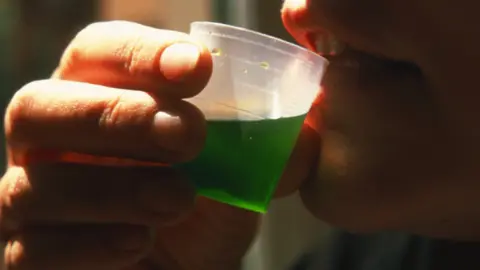Drug addicts in Scotland 'waiting up to six months' for treatment
 SPL
SPLPeople addicted to illegal drugs are waiting up to six months for treatment including being given their methadone prescriptions, BBC Scotland has found.
About 42% of problem users are in treatment compared with about 60% in England.
Under government health targets, drug-using patients should be seen within three weeks.
The Scottish government said 93% were seen inside the target and an extra £20m was being spent annually.
A national target has been set which should result in at least 90% of illegal drug users getting an appointment within three weeks.
Almost all areas of the country - with the exception of Lothian - are meeting that Scottish government target.
However, BBC Scotland has found that in many areas it can take months to receive actual treatment.
A number of agencies helping addicts told the BBC that in some areas it was possible to get a methadone prescription within weeks but that in other areas it could take up to six months.
They said some of the delay was down to important risk assessment appointments but that much of the problem was due to staff shortages.
Dave Liddell, head of the Scottish Drugs Forum, said: "We've seen, currently, waits potentially between three and six months - they are the longest waits that we've observed across the country and obviously that can be devastating for individuals who are desperate to escape the street scene, stabilise their drug use and it can be a matter of life and death for people not getting access quickly enough."
'Drugs ended my football career'
Promising footballer Colin McNair has been speaking to BBC Scotland about how he slipped into a world of drugs.
But he has beaten his habit and now spends his time volunteering at Hamilton Academical helping other people in addiction and recovery.

Scottish government drugs adviser Dr Roy Robertson said it was not enough just to give people an appointment.
He insisted: "The targets have been manipulated to the advantage of services.
"There is no excuse for not treating people and the danger is that if we don't engage them when they come in that they won't come back."
Dr Robertson believes more GPs need to start prescribing methadone and that far more users need to be stabilised on methadone and other opioid replacement therapies.
The government's own figures suggested that about 42% of Scotland's problem drug users were on treatments such as methadone.
In England the number of opioid users in treatment was about 60% - but there were some differences in how the figures were compiled.
Dr Robertson, who is a GP in Edinburgh, said 42% was not good enough and that many more people should be in treatment.
He added: "I mean people are coming to see me, for example, all covered in injecting sites from injecting heroin.
"They need to be fast-tracked into some sort of serious supportive intervention and we've lost the capacity to do that effectively having shifted funds and shifted our attention to a more recovery-based intervention."
Dr Robertson, who is also a professor of addiction medicine at Edinburgh University, said: "There isn't a part of the health service that would say that they don't have a capacity problem, everybody needs more doctors, needs more nurses and there are waiting times and waiting lists all over the place and we have to live with that and I understand that.
"But we really don't have the capacity to take people into treatment quickly or to monitor people or to admit them to supportive therapies or hospital or rehabilitation. We just don't have the capacity, and that does take a lot of money."
Extra millions
The Scottish government will soon be publishing its first new substance misuse strategy in a decade.
It says it will look at putting a much higher focus on treatment and harm reduction and that it will seek to find better ways of gathering information about drug users.
Public Health Minister Aileen Campbell said: "So we've had since 2008 the Road to Recovery strategy and one of the successes has been the three-week referral waiting time.
"We've met that, we've exceeded the target. But then, that's why there is an opportunity with the refreshed drug and alcohol strategy to make sure that the evidence that we have, the data that we gather, absolutely tells us the complete picture around that individual who needs holistic support and help.
"That might not just be a clinical need, it might be housing, it might be the isolation that they have.
"So we need to make that real and will absolutely work hard through the new strategy with the increased resources that we're putting in to make that happen and make sure that people feel that they are given the response in a timely way, that they're given the treatment they require, and that they're able to have a life that feels supported and cared for."
